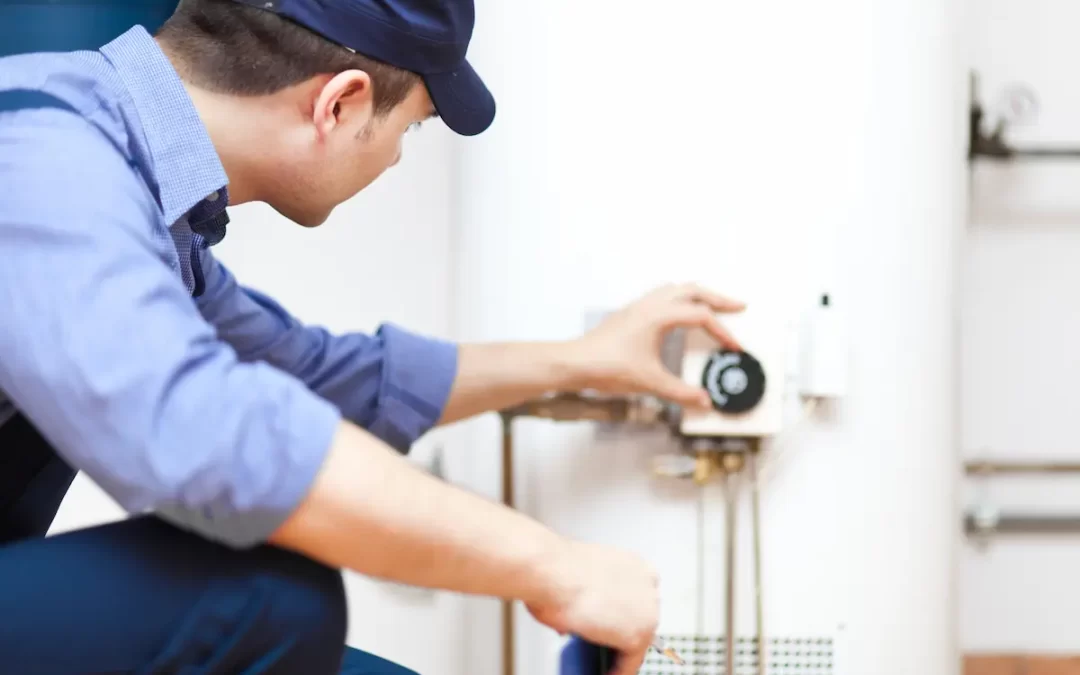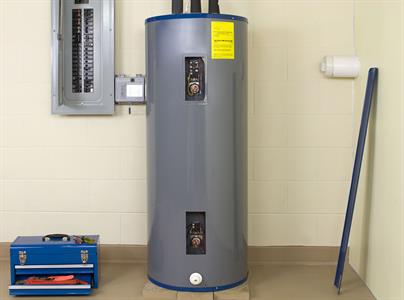If your gas water heater runs out of hot water quickly, it may indicate a thermostat issue or sediment buildup. Regular maintenance can help prevent these problems.
Hot water is essential for daily activities like showering, cleaning, and cooking. A gas water heater usually provides a reliable supply, but running out of hot water unexpectedly can disrupt your routine. Several factors can contribute to this issue, including the heater’s size, thermostat settings, and the presence of sediment.
Understanding these causes helps homeowners address problems efficiently. Regular maintenance not only extends the life of your heater but also ensures optimal performance. This guide will explore common reasons for inadequate hot water supply and offer practical solutions to restore comfort in your home.
Page Contents
- 1 Introduction To Gas Water Heater Issues
- 2 Assessing Your Water Heater’s Capacity
- 3 Sediment Buildup: A Stealthy Culprit
- 4 Faulty Thermostat Settings
- 5 The Dip Tube Dilemma
- 6 Gas Supply Issues
- 7 Water Heater Age And Efficiency
- 8 Professional Versus Diy Fixes
- 9 Preventive Measures And Maintenance
- 10 Frequently Asked Questions
- 11 Conclusion
Introduction To Gas Water Heater Issues
Cold showers can be very frustrating. Many people face this problem often. There are several reasons why hot water runs out quickly.
One common reason is a small tank size. A small tank cannot hold enough hot water for long showers. Another issue might be sediment buildup inside the tank. This buildup can block hot water flow.
Faulty thermostat settings can also cause this problem. If the thermostat does not work well, water won’t heat properly. Old or damaged heating elements may fail to heat water effectively.
Lastly, high hot water demand can lead to quick depletion. Using multiple hot water sources at once can empty the tank faster.
Assessing Your Water Heater’s Capacity
Evaluating your household’s hot water needs is essential. Consider how many people live in your home. Each person uses a certain amount of hot water daily.
For example, showers typically use 10-20 gallons each. Laundry machines may consume around 15-30 gallons per load. Dishwashers can use about 6-16 gallons per cycle.
By adding these amounts, you can determine your total daily usage. Compare this to your water heater’s capacity. A mismatch can lead to running out of hot water quickly.
Consider installing a larger water heater if your needs exceed its capacity. Make sure to assess your family’s habits too.
Sediment Buildup: A Stealthy Culprit
Sediment buildup can significantly affect your gas water heater’s performance. Over time, minerals and debris settle at the bottom of the tank. This buildup reduces the heater’s efficiency. Less efficient heaters use more energy and take longer to heat water.
When sediment accumulates, it creates a barrier. This barrier prevents the heating element from warming the water properly. As a result, hot water runs out quickly during use.
Flushing the tank helps remove sediment and improve efficiency. It is a simple process that can be done yearly. Regular flushing keeps your water heater running smoothly and extends its lifespan.
Faulty Thermostat Settings
Several signs can indicate a faulty thermostat. First, check if the water temperature is inconsistent. A sudden drop in heat means the thermostat might be failing.
Another sign is if the hot water runs out too quickly. This can happen during showers or while washing dishes. If the thermostat settings are incorrect, it won’t heat water effectively.
To ensure optimal performance, adjust the thermostat settings. Set the temperature around 120°F (49°C) for best results. Regularly inspect the thermostat for any issues. This simple check can help prevent running out of hot water.
The Dip Tube Dilemma
The dip tube is a crucial part of a gas water heater. It carries cold water to the bottom of the tank. This allows the hot water to rise to the top for use. A faulty dip tube can cause hot water to run out quickly.
When the dip tube is damaged, cold water mixes with hot water. This results in a shorter supply of hot water. Signs of a faulty dip tube include frequent cold showers and strange noises from the heater.
Replacing a dip tube is often necessary. First, turn off the gas and water supply. Next, drain the tank and remove the old dip tube. Finally, install a new dip tube and refill the tank.
Gas Supply Issues
Gas supply issues can lead to hot water running out quickly. Ensuring adequate gas flow is vital for hot water availability. Check the gas supply line for any blockages. Make sure the gas valve is fully open. Inspect the gas meter to ensure it’s functioning properly.
Troubleshooting common gas supply problems helps maintain hot water supply. Look for gas leaks around connections. Use soapy water to check for bubbles. Listen for hissing sounds, which indicate leaks. If problems persist, contact a professional for assistance.
Water Heater Age And Efficiency
The age of your water heater affects its efficiency. Older models may not heat water well. If hot water runs out quickly, it could be time for a new one.
New energy-efficient models can save money on bills. They also provide a steady flow of hot water. These models often have better insulation and faster heating elements.
Consider replacing your water heater if it is over 10 years old. Look for features like smart technology for better control. Investing in a new unit can improve comfort and reduce energy costs.
Credit: www.quora.com
Professional Versus Diy Fixes
Knowing when to call in the experts is crucial. If the gas water heater runs out of hot water quickly, it may indicate a bigger problem. Issues with the thermostat or heating elements often require professional help. Don’t hesitate to contact a plumber or technician for serious repairs.
Safe DIY maintenance can help extend your water heater’s life. Regularly check the temperature and pressure relief valve. Flush the tank to remove sediment buildup at least once a year. Always turn off the gas and water supply before starting any repairs.
Remember, some fixes need expert knowledge. Complex issues may lead to further damage if attempted alone. Prioritize safety and efficiency when handling your water heater.
Preventive Measures And Maintenance
Regular check-ups are essential for your gas water heater. Schedule professional maintenance at least once a year. This helps identify issues early and ensures proper operation. Clean out any sediment buildup to improve efficiency.
Making simple lifestyle changes can help conserve hot water. Take shorter showers to use less hot water. Fix any leaks in faucets or pipes promptly. Run the dishwasher and laundry machines only with full loads.
Consider installing low-flow fixtures to reduce hot water use. Insulating your water heater can also keep water hot longer. These small steps lead to significant savings on energy bills.

Credit: www.rootermancan.com

Credit: www.allproplumbers.com
Frequently Asked Questions
Why Does My Water Heater Run Out Of Hot Water So Fast?
Your water heater may run out of hot water quickly due to sediment buildup, a faulty thermostat, or inadequate tank size. Frequent use or simultaneous demands can also drain hot water faster. Regular maintenance can help improve efficiency and extend hot water availability.
Why Is My Gas Water Heater Losing Hot Water?
Your gas water heater may lose hot water due to a malfunctioning thermostat, sediment buildup, or a faulty heating element. Check for leaks in pipes or connections, as they can also reduce hot water supply. Regular maintenance helps prevent these issues and ensures efficient operation.
Why Does My Shower Run Out Of Hot Water In 5 Minutes?
Your shower may run out of hot water quickly due to a small water heater or a malfunctioning thermostat. Sediment buildup in the tank can also reduce capacity. Check for leaks or consider upgrading to a larger heater for consistent hot water supply.
Why Does My Hot Water Heater Keep Draining Water?
A hot water heater may drain water due to a leaking valve or a faulty drain valve. Sediment buildup can also cause pressure issues, leading to leaks. Regular maintenance helps prevent these problems. Check for visible leaks and consult a professional if the issue persists.
Conclusion
Experiencing quick hot water depletion from your gas water heater can be frustrating. Understanding the potential causes is key to finding solutions. Regular maintenance, checking the thermostat, and inspecting the heating elements can help. Addressing these issues promptly ensures a reliable supply of hot water for your home.
Keep your comfort a priority.
